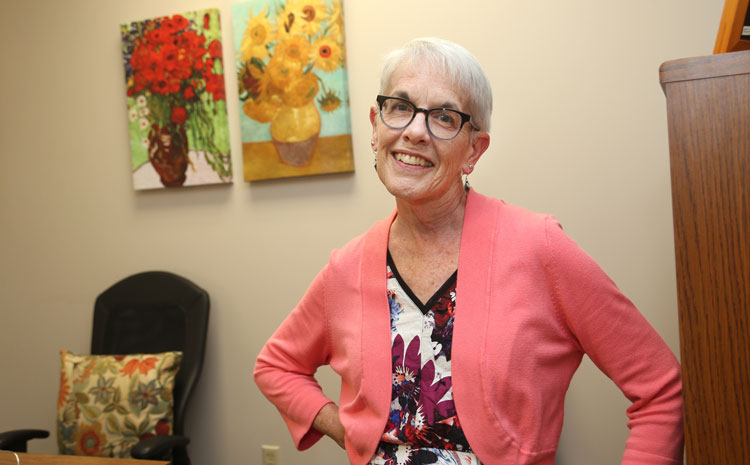
Faculty Spotlight: Susie Allen, DNP Professor
Jul 2, 2019
Growing—and Caring for—the Next Generation of Nurse Leaders
Susan Allen, PhD, discovered her affinity for nursing when she first touched the arm of a geriatric patient. She was in her first clinical setting as a nursing student, and even though pediatrics became her preference, she realized that caring for elderly patients was also high on the list. Overall, what she discovered was that her passion was really about caring for other people, no matter their age or circumstance.
Forty-odd years later, Allen is still caring for people, only now they are not patients. As associate director of the Doctor of Nursing Practice (DNP) in Population Health Leadership online program at Xavier University, she cares for the cohort of students she admits each year into the program, guiding them over three years as they develop their own contributions to improving health care in America.
“I take care of them,” Allen says of her doctoral students. “Nurses go into our profession because they like to care for people. The skills you learn to work with people, to be present with them and help them get through things, are the same whether caring for patients or doctoral students. They need to be cared for, too. I tell them, there is a fundamental reason you went into nursing: You want to care for people. So regardless of your role as a nurse, the foundation of nursing practice is caring.”
Over the span of her career, Allen put her nursing skills to good use caring for children and others at Children’s Hospital Medical Center in Cincinnati, where she has had many roles: As a staff nurse, then head nurse in the Clinical Research Center, as nursing director of the Diabetes and Research Center, and as the assistant vice president for professional development for nursing and allied health in the hospital’s Center for Professional Excellence.
In 2016, after earning her PhD in Nursing Research at the University of Cincinnati, Allen brought the wealth of her skills and passion for caring to Xavier as an assistant professor of nursing. In 2017 she became associate director of the DNP program, which is devoted to the improvement of processes, practices and outcomes in clinical environments.
Allen and the nursing faculty in the College of Nursing work closely with their doctoral students for the entire three years of the program. The students need that kind of attention to complete 13 courses and an in-depth scholarly project. Allen teaches six courses—including those focused on theories of care and leadership and the economics of health care—and she mentors the students through their DNP research projects where they focus on improving outcomes within a population of their choice.
Admission into the program is competitive. Allen selects only those students with the best chance of succeeding. All must be an RN and have a master’s degree in nursing or a master’s in another field with a BSN. Most have several years of experience working as a nurse, though only one year is required. All submit a topic they want to explore to improve health-care systems and processes within a particular population, with the long-term goal of contributing to population health—keeping people healthy rather than treating them only when they’re sick.
“Our focus is on nursing leadership and population health,” Allen says. “Our program will give you a broad look at a broad need, a global issue, how are we going to improve the health of people in our country? We spend far more on health care than other developed countries, but our outcomes are worse. A lot of the program examines why is that the case, and what are you going to do about this as a nursing leader in population health?”
The program has been quite successful so far. Since its first cohort began in the fall of 2014, a total of 19 students have graduated. There are 21 students currently enrolled and another cohort preparing to start in the fall. Because the program is fully online, several live out of state including in Texas, North Carolina and Indiana. Students are asked to attend an orientation on campus for each new cohort in the first semester.

The diversity of students’ backgrounds helps to elevate the level of course discussions. Their research projects are also diverse, delving into topics such as developing a safety protocol when discharging children back home, or creating a wrist band device for kids with bone marrow transplants to record activities of daily living like brushing teeth to lower infection rates.
One of the first students to graduate in 2017 was Remi Oriowo, (pictured right), a native of Nigeria who joined her daughters in Ohio and earned her MS in Nursing from Xavier in 2011 and came back for her doctorate in 2014. Now as the System Clinical Educator for Premier Health Learning Institute in Dayton, Ohio, Oriowo coordinates continuing education programs for nurses to meet state requirements. Her doctoral research project delved into the causes of hospital readmission rates of elderly cardiac patients and how to help them stay healthier at home.
“What fascinated me with the doctoral program was the use of the Jesuit principles,” she said. “It’s aligned so well with what we are required to do with population health. The goal is to be able to lead population health management, which means I should be able to work with a group of health professionals and be able to apply research evidence in a practical way to improve health care.”
Combining Jesuit principles with Xavier’s emphasis on holistic nursing is a natural fit and a key part of the program, Allen says. One of the students' favorite assignments is comparing Jesuit values with nursing values.
“It’s eye opening,” she says. “It helps makes sense of the reality. One of the awakenings for students is that the Jesuit values we teach reinforces the nursing values they already believe. It’s making connections with people and working to improve their health or keep them healthy.”
A sampling of students' DNP projects since 2017:
- Readmissions, Telehealth, and a Handoff to Primary Care in Veterans with Diabetes
- Evaluation of Use of the Psychosocial Assessment Tool (PAT) with Pediatric Surgical Patients
- Educating the Current and Future Nursing Workforce on Principles of Health Equity: Standardized Social Determinants of Health Screening Tool and Education Module
- Be the Voice: Empowering Families to Report Concerns in Care
- Delirium Management of Older Adults in the Medical-Surgical Setting
- Use of a Portable Medical Summary to Provide Continuity across Systems of Care as Youth with Medical Complexity Transition to Adult Care
- Increasing Human Papillomavirus Immunization in Pediatric Cancer Survivors for Population Health: A Quality Improvement Approach
Learn more about the DNP in Population Health Leadership.